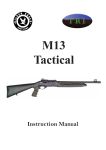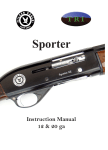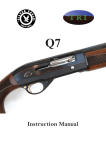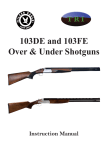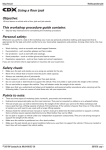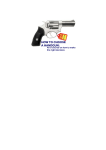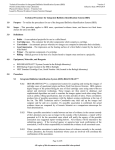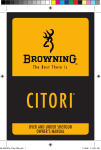Download Stalker - TR Imports
Transcript
Stalker Single Shot Instruction Manual 12ga & .410 ALWAYS KEEP THIS MANUAL WITH YOUR FIREARM. INCLUDE IT WITH THE FIREARM WHEN IT CHANGES OWNERSHIP. WARNING: ALL FIREARMS CAN BE DANGEROUS AND CAN CAUSE SERIOUS INJURY, DAMAGE TO PROPERTY OR DEATH. THE FOLLOWING SAFETY RULES ARE AN IMPORTANT REMINDER THAT FIREARM SAFETY IS YOUR RESPONSIBILITY. WARNING: READ THE ENTIRE MANUAL CAREFULLY BEFORE USING THIS FIREARM. MAKE SURE THAT ANY PERSON USING OR HAVING ACCESS TO THIS FIREARM READS AND UNDERSTANDS THIS ENTIRE MANUAL PRIOR TO USE OR ACCESS. WARNING: Always ensure that the safety is fully engaged until ready to fire! NOTICE: The Manufacturer and/or its Official Distributors assume no liability for product malfunction or for physical injury or property damage resulting in whole or in part from criminal or negligent use of the product, improper or careless handling, unauthorized modifications, use of defective, improper, hand loaded, reloaded or remanufactured ammunition, customer misuse or neglect of the product, or other factors beyond manufacturer’s direct and immediate control. In addition to the Basic Safety Rules, there are other Safety Rules pertaining to the loading, unloading, disassembly, assembly and use of this firearm, located throughout this manual. WE RECOMMEND THE USE OF ORIGINAL SPARE PARTS AND ACCESSORIES. THE USE OF OTHER MANUFACTURERS’ SPARE PARTS AND ACCESSORIES COULD CAUSE MALFUNCTIONS AND/OR BREAKAGES THAT WILL NOT BE COVERED BY THE SILVER EAGLE WARRANTY. 2 BASIC SAFETY RULES CAUTION: READ THIS MANUAL CAREFULLY BEFORE USING THE SHOTGUN. CAUTION: FIREARMS CAN BE DANGEROUS AND CAN CAUSE SERIOUS INJURY, DAMAGE TO PROPERTY OR DEATH, IF HANDLED IMPROPERLY. THE FOLLOWING SAFETY RULES ARE AN IMPORTANT REMINDER THAT FIREARM SAFETY IS YOUR RESPONSIBILITY. 1. NEVER POINT A FIREARM AT SOMETHING THAT IS NOT SAFE TO SHOOT. Never let the muzzle of a firearm point at any part of your body or at another person. This is especially important when loading or unloading the firearm. When you are shooting at a target, know what is behind it. Slugs and shot can travel farther than their intended range. If you miss your target or if a projectile penetrates the target, it is your responsibility to ensure that the shot does not cause unintended injury or damage. 2. ALWAYS TREAT A FIREARM AS IF IT WERE LOADED. Never assume that a firearm is unloaded. The only certain way to ensure there are no cartridges in a firearm is to open the chamber and visually and physically examine the inside to see if a round is present. Removing or unloading the magazine will not guarantee that a firearm is unloaded or cannot fire. Shotguns can be checked by cycling or removing all rounds and by then opening and inspecting the chamber so that a visual inspection of the chamber for any remaining rounds can be made. 3 3. STORE YOUR FIREARM SO THAT CHILDREN CANNOT GAIN ACCESS TO IT. It is your responsibility to ensure that children under the age of 18 or other unauthorized persons do not gain access to your firearm. To reduce the risk of accidents involving children, unload your firearm, lock it and store the ammunition in a separate locked location. Please note that devices intended to prevent accidents - for example, cable locks, chamber plugs, etc., - may not prevent use or misuse of your firearm by a determined person. Firearm storage in a steel gun safe may be more appropriate to reduce the likelihood of intentional misuse of a firearm by a child or unauthorized person. 4. NEVER SHOOT AT WATER OR AT A HARD SURFACE. Shooting at the surface of water or at a rock or other hard surface increases the chance of ricochets or fragmentation of the bullet or shot, which can result in the projectile striking an unintended or peripheral target. 5. KNOW THE SAFETY FEATURES OF THE FIREARM YOU ARE USING, BUT REMEMBER: SAFETY DEVICES ARE NOT A SUBSTITUTE FOR SAFE HANDLING PROCEDURES. Never rely solely on a safety device to prevent an accident. It is imperative that you know and use the safety features of the particular firearm you are handling, but accidents can best be prevented by following the safe handling procedures described in these safety rules and elsewhere in the product manual. To further familiarize yourself with the proper use of this or other firearms, take a Firearms Safety Course taught by an expert in firearms use and safety procedures. 6. PROPERLY MAINTAIN YOUR FIREARM. Store and carry your firearm so that dirt or lint does not accumulate in the working parts. Clean and oil your firearm, following the instructions provided in this manual, after each use to prevent corrosion, damage to the barrel or accumulation of impurities which can prevent use of the firearm in an emergency. Always check the bore and chamber(s) prior to loading to ensure that they are clean and free from obstructions. Firing with an obstruction in the barrel or chamber can rupture the barrel and injure you or others nearby. In the event you hear an unusual noise when shooting, stop firing 4 immediately, engage the manual safety and unload the firearm. Make sure the chamber and barrel are free from any obstruction, such as part of a cartridge stuck inside the barrel due to defective or improper ammunition. 7. USE PROPER AMMUNITION. Use only factory-loaded, new ammunition manufactured to industry specifications: CIP (Europe and elsewhere), SAAMI® (U.S.A.). Be certain that each round you use is in the proper gauge and type for the particular firearm. The caliber or gauge of the firearm is clearly marked on the barrel. The use of reloaded or remanufactured ammunition can increase the likelihood of excessive cartridge pressures, case-head ruptures or other defects in the ammunition that can cause damage to your firearm and injury to yourself or others nearby. 8. ALWAYS WEAR PROTECTIVE GLASSES AND EARPLUGS WHEN SHOOTING. The chance that gas, gunpowder or metal fragments will blow back and injure a shooter who is firing a gun is rare, but the injury that can be sustained in such circumstances can be severe, including the possible loss of eyesight. A shooter must always wear impact resistant shooting glasses when firing any firearm. Earplugs and other high-quality hearing protectors help reduce the chance of hearing damage from shooting. 9. NEVER CLIMB A TREE, FENCE OR OBSTRUCTION WITH A LOADED FIREARM.. Open and empty the chamber(s) of your firearm and engage the manual safety before climbing or descending a tree or before climbing a fence or jumping over a ditch or other obstruction. Never pull or push a loaded firearm toward yourself or another person. Always unload a firearm, visually and physically check to see that the magazine, loading mechanism and chamber are unloaded, and action is open before handing it to another person. Never take a firearm from another person unless it is unloaded, visually and physically checked to confirm it is unloaded, and the action is open. 5 10. AVOID ALCOHOLIC BEVERAGES OR JUDGEMENT/REFLEX IMPAIRING MEDICATION WHEN SHOOTING. Do not drink and shoot. If you take medication that can impair motor reactions or judgement, do not handle a firearm while you are under the influence of the medication. 11. NEVER TRANSPORT A LOADED FIREARM. Unload a firearm before putting it in a vehicle (chamber empty, magazine empty). Hunters and target shooters should load their firearm only at their destination, and only when they are ready to shoot. If you carry a firearm for self-protection, leaving the chamber unloaded can reduce the chance of an unintentional discharge. 12. LEAD WARNING. Discharging firearms in poorly ventilated areas, cleaning firearms, or handling ammunition may result in exposure to lead and other substances known to cause birth defects, reproductive harm, and other serious physical injury. Have adequate ventilation at all times. Wash hands thoroughly after exposure. CAUTION: It is YOUR responsibility to know and abide by federal, state and local laws governing the sale, transportation and use of firearms in your area. WARNING: This firearm has the capability of taking your life or the life of someone else! Always be extremely careful with your firearm. An accident is almost always the result of not following basic firearm safety rules. For information about Firearm Safety Courses in your area, please visit the National Rifle Association’s web site at www.nra.org. 6 NOMENCLATURE BBarrel B1 Muzzle B2 Front Sight B3 Adjustable Rear Sight RReceiver SStock S1 Buttstock S2 S3 T1 T2 T3 T4 Fore End Butt Plate Safety Button Trigger Trigger Guard Action Lever 1 2 3 4 5 7 GENERAL DESCRIPTION HIGH CHROME-MOLY BARREL Barrel is bored from state-of-the industry solid bar C4140 German steel. Plated with hard chrome, it is fully compatible with steel, heavy shot and slugs. ADJUSTABLE SIGHT SYSTEM High-visibility fiber optic front sight promotes fast target acquisition and is easily seen in a wide variety of light conditions. Rear sight is fully adjustable in elevation and windage. SIMPLIFIED ACTION Hammerless design and lever-actuated break action is extremely simple and durable - perfect for young shooters. Gun stores in compact folded-open position, an added safety feature. TRIGGER ASSEMBLY Large trigger guard permits quick hand positioning even while wearing gloves. Standard cross-bolt safety is installed in rear of trigger guard. TECHNICAL FEATURES AND SPECIFICATIONS Gauge 12, .410 Barrel Steel with chrome-plated bore; fixed choke Barrel Chamber Rear Sight Front Sight Operation Locking System Receiver Safety Magazine Capacity Stock Length of Pull Drop Weight 76mm; accepts 23/4 and 3 inch shells Open notch, fully adjustable (slug model) Fiber optic Single shot, break action Lever-actuated spring-secured Steel Cross-bolt, uni-directional 1 shell Walnut or synthetic 14.5 inches, (13 inches, youth model) DAC: 1.5” DAH: 2.25” 4lb 7oz - 5lb 8oz (depending on gauge & barrel) 8 OPERATION NOTE: numbers listed in the text refer to illustrations above, on page 7. OBSTRUCTION & BARREL CHECK Check the barrel to ensure there are no obstructions in the chamber and bore. This is extremely important because serious injury can result to the user or to nearby persons if a cartridge is fired in an obstructed barrel or chamber. Check the inside of the barrel prior to completely assembling the firearm and before use; if the firearm is already assembled the following procedure should be followed: • Look right through the barrel from the rear and make sure there are no obstructions, even minor ones. • If an obstruction in the barrel is detected, a competent gunsmith must remove the obstruction. Reinspect the shotgun before firing. WARNING: During preparation for shooting, never point a firearm at someone or at hard and flat surfaces. Treat the firearm as if it were loaded. (See paragraphs 1, 2, and 4 of the BASIC SAFETY RULES). AMMUNITION WARNING: The manufacturer and distributor assume no liability for physical injury or property damage resulting from the use of defective, improper, hand-loaded, reloaded or remanufactured ammunition. Serious damage or injury, even death, may be caused by the use of ammunition that is not suitable, loaded with force, or loaded with obstructions in the barrel. WARNING: Never use cartridges that do not correspond to the indications on the barrel. WARNING: Only use cartridges with a length equal to or less than the chamber length indicated on the barrel. WARNING: To avoid using improper ammunition, always check the characteristics stamped on the cartridge box and on the cartridge. Be sure to use the right cartridge gauge and length for your firearm. 9 STEEL SHOT The barrel is designed for use with factory steel shot cartridges loaded to international standard specifications, but steel shot is not recommended in guns with a full choke (Stalker youth .410 with vent rib and 22 inch barrel). Tighter choke constrictions, (IM, F) when using steel shot, do not increase pattern density and will accelerate wear and tear. The use of reloaded or remanufactured ammunition can increase the likelihood of excessive pressure, case rupture or other defects in the ammunition. Your Stalker is chambered for 3” and shorter shells. You will find markings for the gauge and chamber length on the side of the barrel. The Stalker has been tested with special proof test ammunition in accordance with government quality control standards. CHOKES Fixed chokes are installed as follows: Youth, 20” with adjustable sights: Improved Cylinder (IC) Youth, 22” with ventilated rib: Full (F) LOADING THE FIREARM WARNING: Before loading the firearm, ensure that the safety is engaged. Always keep the firearm pointed in a safe direction. (See 1, 2 and 4 of the BASIC SAFETY RULES.) WARNING: The shooter and all bystanders must always wear protective eyewear and ear protection during shooting. Residue from gunpowder, lubricant or metal fragments may be projected backwards and cause injury. Noise-reducing earplugs or earmuffs will reduce the risk of damage to hearing caused by prolonged shooting activity. WARNING: Always keep your finger off the trigger and avoid contact of other objects with the trigger if you don’t intend to fire. • Engage the safety by pushing the button until the red ring disappears.(fig 1) • Pull the action lever rearward and pull down firmly on the barrel to open the shotgun (fig 2). • Insert a shell into the exposed chamber until the rim of the shell rests on the extractor (fig 3) • Reclose the shotgun. When you are ready to shoot, with the gun pointed in a safe direction, disengage the safety by pressing the safety button from the right side. 10 WARNING: When the red ring on the safety button is visible, the firearm is in the FIRE position. (fig 4) WARNING: After pulling the trigger, if the shotgun doesn’t fire, engage the safety, wait at least one minute and unload the shotgun as described in “UNLOADING THE FIREARM,” below. Never attempt to fire ammunition that did not fire the first time. Dispose of misfire or faulty ammunition properly in accordance with the cartridge manufacturer’s instructions. UNLOADING THE FIREARM WARNING: The firearm is loaded and ready to fire. Always keep your finger off the trigger and avoid contact with the trigger by other objects if you don’t intend to fire. Never point the firearm at someone or at hard, flat surfaces. (See points 1, 2 and 4 of the BASIC SAFETY RULES.) • Keeping the firearm pointed in a safe direction, check that the safety is engaged (red ring not visible). • Pull the action lever rearward and pull down firmly on the barrel to open the shotgun (fig 2). • Remove the shell (fig 3) TRANSPORTATION AND STORAGE • Your Stalker is designed to be transported and stored in the fully folded position. After unloading, continue to rotate the barrel until the trigger guard comes to a stop inside the recess in the fore end (fig 5). • In the fully folded position, the shotgun is compact and easily stored, and the action is fully exposed, making it easy to confirm that the gun is unloaded and the barrel is free from obstructions. ROUTINE MAINTENANCE At the end of a shooting day, clean your gun as follows. • Carefully clean the inside of the barrel with a suitable gun cleaning patch and solvent to remove fouling and plastic residue deposited by shot cups. For heavy deposits, it may be necessary to use a bronze bore brush. • When you believe you have removed all deposits, push a clean patch through the barrel. A clean barrel will have a mirror-like appearance. • Because the bore is plated with hard chrome, it is not necessary to oil it. • Check the barrel. The barrel and cartridge chamber must be clean and free of obstructions. 11 • Wipe the breach with solvent and wipe it dry. • Exposed steel surfaces, including the cartridge chamber and muzzle should be treated with a light coat of oil for protection against rust. WARNING: Excess oil or grease in the bore are dangerous when firing, and may damage the shotgun or injure the shooter or bystanders. Never apply lubricants to shotshells. • Periodically, and always at the beginning and end of the shooting season, inspect all moving parts for cleanliness, freedom of motion, and the absence of damage and excessive wear. • If you believe that anything beyond routine maintenance is required, take your gun to a qualified gunsmith or contact T R Imports. WARRANTY INFORMATION Firearms distributed by TRI carry a Two-Year Limited Warranty to the original purchaser for defects in materials or workmanship. If the original purchaser registers his firearm with TRI, he automatically receives an additional three years of warranty coverage for a total of five years. For more detailed information, please visit www.trimports.com/support. If you do not have access to the internet, call and we will assist you in registering your gun. HOW TO OBTAIN SERVICE For fastest service, contact us directly: T R Imports Inc Telephone: 817-750-2291 5778 Park Vista Circle 866-419-6271 Suite 302 Fax: 817-581-4222 Fort Worth, TX 76244 Email: [email protected] Web: trimports.com For questions, suggestions, or to discuss anything not covered in this manual, please call us, 9am-5pm Central, Monday-Friday. We thank you for the confidence you have shown in our products, and we look forward to hearing from you. Thank you! 12












